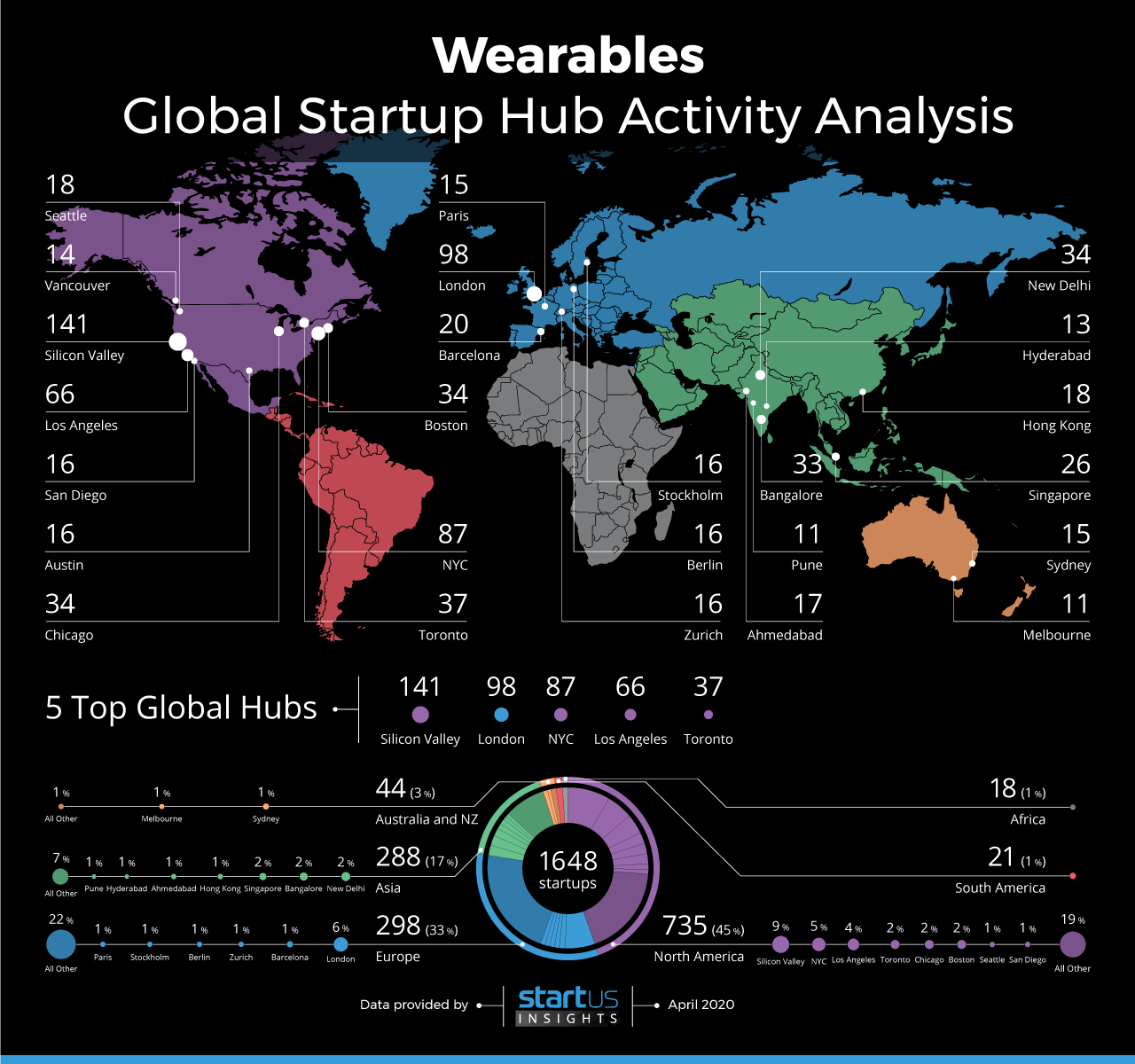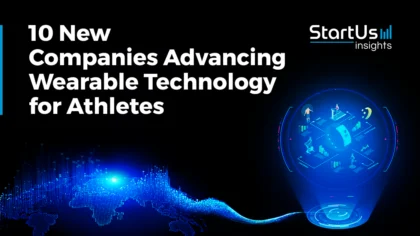Wearables constitute a multidisciplinary area at the intersection of technology and fashion, with applications across multiple industries. Though largely perceived as wrist bands and watches, wearables also exist as patches, headsets, smart clothing, and implantables to name a few forms. Expert projections estimate wearable devices to grow as the second-largest consumer electronics sector, only after smartphones. The value proposition of the technology lies in the ability to gather increasingly large amounts of data in real-time from the wearer and to analyze it to provide useful insights. With the advent of the Internet of Things (IoT), wearables also offer a novel and smart way to interact with other devices and infrastructure.
Fitness and healthcare continue to remain in the top 2 sectors for wearable devices. Fitness trackers are becoming smarter as they now facilitate contactless interactions, such as making payments. Innovations in healthcare wearables focus on making them smaller, lighter, and more inconspicuous. Other than these two sectors, entertainment, with the advances in augmented/virtual reality (AR/VR), is also witnessing a lot of innovation in wearables.
Top 5 Wearables Startup Hubs
Using our StartUs Insights Platform, we analyzed the geographic distribution of global activity in wearables. We identified 25 regional hubs* that observe high activity in developing wearables solutions across industries like healthcare, construction, and finance to name a few.
According to our data, Silicon Valley, London, New York City, Los Angeles, and Toronto are home to 428 startups* and account for 26% of global startup activity. Let us have a look at some of the wearables startups from these 5 top hubs.
According to our data, slightly over three-fourths of all activity in wearables occurs in North America and in Europe. Novel use cases for wearables combined with hubs for innovations in the sector create ideal conditions for the technology to disrupt multiple industries, such as healthcare, manufacturing, and finance.
Even though the rest of the world sees comparatively lower activity, India, Singapore, and Australia are home to a significant number of energy storage solutions. As the adoption of wearables grows among consumers, regional startups are set to adapt them to solve local challenges.
#1 Silicon Valley | 141 Startups
Even though Silicon Valley does not look like a fashion hub, compared to other cities in this list, its depth of tech talent and investments more than compensate for it. In 2018, the Department of Defense and FlexTech Alliance, a consortium that includes companies such as Apple, Motorola, and Boeing, announced the launch of NextFlex, a tech hub that intends to stimulate the growth of flexible and wearable electronics. While the tech giants invest in fitness bands and health data, startups are expanding the scope of wearable tech beyond fitness.
Silicon Valley startup Neuromatic offers solutions for brain-computer interface applications. For the automotive industry, the startup continuously monitors complex driver effectiveness with a wearable headset connected to a smartphone. The solution detects drowsiness to predict sleepiness and alerts drivers to prevent sleep-related accidents. The startup’s solution also enables the evaluation of driver performance data to facilitate usage-based insurance.
#2 London | 98 Startups
In addition to money and tech, London is also a global hub for fashion. The intersection of tech, fashion, and finance makes London an exciting market for wearables. The city also houses the headquarters of Women of Wearables (WoW), a global organization that aims at promoting women in wearable tech. As Europe continues to embrace contactless payments, London stands to lead the market for wearable devices in the region.
Litho is a London-based startup that develops a small wearable controller. It sits comfortably between the index and middle fingers and connects to phone or AR devices via Bluetooth. The controller combines a touch surface on the underside, custom haptic feedback, and an array of motion-tracking sensors to enable intuitive and precise interaction with digital objects in the real world.
# 3 New York City | 87 Startups
New York City’s dominance in fashion and design make it an attractive location for wearables startups. Design incubators and initiatives, such as EyeBeam, Manufacture New York, and New York Fashion Tech Lab promote wearable tech innovations in the area. Startups in the hub work on wearables for a wide range of applications: from individual to commercial solutions.
New York City-based startup Kwant.ai combines low powered wide area network (LPWAN) and wearables to automate construction site data collection. The wearable sensors are waterproof, dustproof, and rugged, while also being small and lightweight enough to attach to belts or hardhats. These sensors track worker, material, and vehicle locations to within 6” of accuracy and send instant alerts for falls or slips to improve worker safety.
#4 Los Angeles | 66 Startups
As wearable technology matures from fitness bands to a range of other applications, startups are exploring VR/AR applications. The presence of Hollywood makes Los Angeles a hub for VR/AR and, subsequently, wearables. Moreover, HealthTech startups in the city are also driving innovations in wearable tech with innovative use cases including diagnosis, monitoring, and treatment.
Allevion is a Los Angeles-based startup that offers a non-invasive wearable to treat essential hand and leg tremors. The device employs novel algorithms to deliver multimodal stimulation and learns to adjust it to optimize patient response. It is discreet and eliminates the need for clumsy physical aids and pharmacologic or surgical treatments.
#5 Toronto | 37 Startups
As the place, where modern wearable technology finds its roots, Toronto looks set to maintain its position as a global hub. Initiatives, such as FashionTech Toronto and the Toronto chapter of We Are Wearables work to promote advancements in wearables. The diversity of innovations in Toronto facilitates the multi-disciplinary approach required in wearable startups. In particular, sports companies are rapidly incorporating wearable technologies to offer an edge to their athletes.
Toronto-based startup awarewear develops intelibean, a brain impact event monitor. The monitor is an inexpensive, lightweight, waterproof, rechargeable device that sits behind the ear. The wearable measures and reports impacts on the brain to ensure that no event goes unnoticed. This improves concussion protocols and provides comprehensive real-time insights on player biometrics and performance.
What’s Next?
Fitness and healthcare continue to be the focus of a lot of wearables companies. However, startups are now developing use cases for wearables in a wide range of industries, such as construction, manufacturing, and finance. As wearables continue to reach more people, innovations will also be seen from regions other than the traditional tech or design hubs.
* A hub is defined as the regional geographic center of activity for this topic. It covers the center point with a radius of 100km. We define startups as companies founded after 2015.










